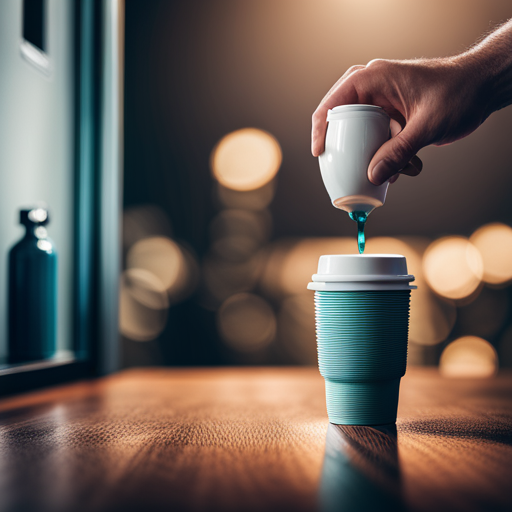Are you tired of waiting forever for a glass of refreshing water from your fridge dispenser? A slow flow can be frustrating and inconvenient, especially when you’re in a hurry or entertaining guests. Fortunately, there are several easy solutions to fix your slow fridge water dispenser now. By taking a few simple steps, you can enjoy fresh, filtered water without the wait.
The most common causes of slow flow include clogs, improper installation, and old filters. Luckily, these issues can be easily resolved with just a little bit of maintenance.
In this article, we’ll explain the common causes of slow flow and provide you with easy solutions to fix your slow fridge water dispenser now. By following our tips, you’ll be able to enjoy a steady flow of water from your fridge dispenser in no time.
Key Takeaways
– Slow flow can be caused by clogs, improper installation, old filters, debris, and sediment accumulation.
– Proper maintenance includes replacing filters every six months, flushing the water system after filter installation, using filtered water for ice making, and troubleshooting to determine cause and solution.
– Benefits of proper maintenance include a steady flow from the fridge water dispenser, clearer and better-tasting ice, and reduced mineral build-up that can damage the refrigerator.
– Completely clogged filters should be replaced immediately, and proper flushing techniques should be followed to prevent air pockets from forming.
Causes of Slow Flow
If your fridge water dispenser is slow, it could be caused by several factors. One of the most common filters that can cause slow flow is a completely or partially clogged filter.
Over time, filters can accumulate debris and sediment that restrict the flow of water. If you notice that your water flow is slower than usual, it may be time to replace your filter. You should aim to replace your filter every six months to ensure optimal performance.
Another common cause of slow flow is an improperly installed filter. If your filter is not installed correctly, it can cause water to flow slowly or not at all. To ensure proper installation, follow the manufacturer’s instructions carefully and make sure the filter is securely in place.
Additionally, failure to flush the water system after filter installation can cause slow flow. To avoid this issue, flush your water system by depressing and holding the water dispenser lever for five seconds, releasing it for five seconds, and repeating until the water flows steadily.
These troubleshooting tips should help you determine the cause of slow flow and fix your fridge water dispenser.
Solutions and Maintenance
To maintain a steady flow from your refrigerator water dispenser, make sure to properly install the filter and flush the water system after installation or replacement. If the filter is completely clogged, replace it immediately. If it’s partially clogged, replace the filter every six months. Follow the manufacturer’s instructions for proper installation.
After installation or replacement, flush the water system by depressing and holding the water dispenser lever for five seconds, releasing for five seconds, and repeating until water flows steadily.
If you’re experiencing slow flow from your fridge water dispenser, troubleshoot to determine the cause. Check the pressure with the filter removed to see if the issue is with the filter or the water supply. If the filter is the problem, try replacing it. If the slow flow persists, there may be clogs in the water supply due to sediment entering the filter, usually caused by construction in the area.
By following these maintenance and troubleshooting tips, you can ensure a steady flow from your refrigerator water dispenser.
Flushing the Water System
One way to ensure a steady flow from the water dispenser on your refrigerator is by properly flushing the water system after replacing the filter. This process involves depressing and holding the water dispenser lever for 5 seconds, releasing it for 5 seconds, and repeating until the water flows steadily. It’s important to follow this proper technique to prevent any air pockets from forming in the system, which can lead to low flow or no water at all.
In addition to flushing after filter replacement, it’s recommended to flush the water system every six months to ensure optimal performance. Troubleshooting common issues such as low water pressure or clogged filters can also be resolved by flushing the water system.
The potential benefits of using filtered water for ice making include clearer and better-tasting ice, as well as reducing the build-up of minerals that can damage your refrigerator over time. By following proper maintenance and flushing techniques, you can ensure a reliable and steady flow from your refrigerator water dispenser.
Conclusion
Congratulations! You’ve successfully fixed your slow fridge water dispenser. By following the solutions and maintenance tips provided in this article, you were able to identify the cause of the slow flow and take action to resolve it.
Now you can enjoy fresh, filtered water without the frustration of waiting ages for it to dispense. Remember to regularly replace your filter, check for clogs, and ensure proper installation to prevent future slow flow issues.
Additionally, flushing the water system periodically will help maintain the quality of your water and prolong the life of your filter. With these simple steps, you can keep your fridge water dispenser flowing smoothly and enjoy refreshing, clean water whenever you need it.




